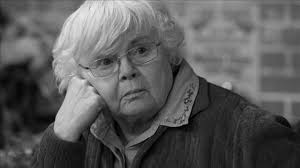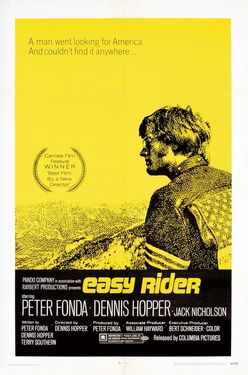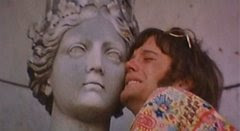The women in the films of writer/director Alexander Payne are a mixed bag. I enjoyed his early film, Citizen Ruth but the contempt he seemed to have for most of the women characters seeped into–and made me hesitate to laugh at–the movie’s comedy. I hated Election in spite of a pre-stardom Reese Witherspoon in the lead and the cool, teenaged lesbian character in a prominent supporting role: what some other critics have called misanthropy in Payne’s body of work seemed to me more like misogyny.
I skipped About Schmidt because Jack Nicholson and Alexander Payne didn’t seem like a woman-friendly combination, a hunch confirmed when even male critics used the m-word to describe the film. I thought I’d also avoid Sideways with its manchild protagonist, but when I saw the movie, late in its run, I loved it: the same care had gone into developing the Virginia Madsen and Sandra Oh characters as Payne had put into creating the roles played by Paul Giamatti and Thomas Haden Church. Payne’s next film, The Descendants had a comatose, unfaithful “bad” mother at its crux but also showed her willful, smart-mouthed daughters (Shailene Woodley played the older of the two) at their most vulnerable. So I went into Nebraska, nominated for a slew of Oscars including Best Picture, Best Actor, Best Supporting Actress and Best Director, hopeful but cautious. But in this film Payne seems to be going not sideways, but backwards.

The film’s focus is on the relationship between two men: addled, alcoholic Woody (Bruce Dern, nominated for Best Actor) and his son David (Will Forte, who many know from his days on Saturday Night Live). David ends up taking his father on a quixotic road trip to collect the money Woody mistakenly and stubbornly believes he’s won through a letter from a company that is very much like Publishers’ Clearing House. We see many scenes that demonstrate the challenge Woody’s drinking and encroaching dementia are for his son (who seems to be around 40 and able-bodied), but David never considers that the trip might be a chance for his own mother to have a break from being Woody’s sole caretaker. Instead, David repeatedly says he agreed to drive his father over two states because the trip might be the last chance for the two of them to spend some time together.
June Squibb plays Woody’s wife and David’s mother, Kate, and is the film’s nominee for Best Supporting Actress (she also played Jack Nicholson’s wife in About Schmidt). She has the kind of face that moviegoers are used to seeing everywhere but onscreen: an 80-something woman who doesn’t appear to have undergone any plastic surgery and doesn’t look like she’s just come from a session with a team of makeup artists and hair colorists.

Anyone who has known an older woman left alone to take care of a husband in declining health will recognize the exasperated tone and facial expression Kate uses whenever she speaks to Woody. David, in contrast, is unfailingly patient and calm, like a cross between a therapist and Mr. Rogers, when he talks to his taciturn and pigheaded father, perhaps because he knows when the trip is over, his father’s care will go back to being Kate’s responsibility and will remain so until he dies–or she does.
We can see that Kate, direct and bereft of tact, is supposed to be a refreshing change from the smiling, always forgiving grandmothers of yore, but seeing her yell and swear reminds me of every role Betty White has played in recent years, the same role that goes to many other actresses once they hit 65. Dern’s character is also often angry and uses crude language, but as limited as his character is we do see other aspects of him, both in Dern’s performance and in exposition from the other characters. So much of our time and focus goes to this character, we think that his opaque and maddening surface will crack so that he can can finally show some affection and gratitude toward his son or to his old girlfriend whom his son encounters in the town where he was raised, but Woody remains selfish, irascible and without redeeming qualities to the end.
A better and more interesting movie would have included more about Kate. In spite of the women all around us who take care of men when they get old and sick (even though these women are often not young themselves) we very rarely see movies about a woman who is a caretaker: off the top of my head the only film I can think of is Marvin’s Room. But Payne doesn’t seem to give much thought to Kate’s situation. In all but one scene, Kate is called on to be testy and not much else. Even though we laugh as she chirps the cause of death of a late, but not lamented, relative and we feel satisfied when she cusses out greedy members of Woody’s family, the character is more of an exclamation point than a person.
That we, in the audience, aren’t as sick of the Grandma Who Talks Dirty trope as we are of the Magical Negro or the Sassy Gay Best Friend shows that the culture either isn’t paying attention or doesn’t care how older women are portrayed. Philomena is another Oscar-nominated film (for Best Picture, Best Actress, Best Adapted Screenplay, and Best Score) which features an older woman, and it left me frustrated for slightly different reasons.
Although Philomena is based on a true story about the title character (Best Actress nominee Judi Dench), it’s equally about the journalist, Martin Sixsmith (Steve Coogan), who helps in her search for the son who was taken from her (sold to American “adoptive” parents) when she was a young, single mother. Philomena Lee was sent to a Magdalen laundry (run by the Catholic Church but also supported by the Irish state) to have her baby and afterward forced, along with many other girl and women “sinners”, to work washing clothes for years afterward with no pay–a part of Irish history which receives a more detailed treatment in 2002’s The Magdalene Sisters.
I understand why the film makes Sixsmith an equal player in the story (the film is, after all, based on his book and was brought to the screen by Coogan), and the culture clash between romance-reading Philomena and Oxford-educated Martin is mildly entertaining, but this film reminded me a little too much of films from the 1980s like Mississippi Burning and Cry Freedom, in which stories about Black people were told through a white-guy main character and savior. I had the feeling if Sixsmith’s character had taken his rightful place as a background figure no producer would have put up the money for this film.

In Philomena, we again have an older woman with a surprising vocabulary: I guess I should be grateful that a mainstream movie features a lead actress (especially one of Judi Dench’s stature) saying the word “clitoris,” but I wish the scene weren’t played for a cheap laugh. Philomena Lee embodies contradictions that many of us have seen in our own families: women who remain devoted to the Catholic Church after years of being mistreated by it (with the people now around them pointing out that mistreatment), whose ideals are also more liberal than the church’s dogma.
I wanted to see more of the women I knew in Dench’s performance, but she’s miscast. She doesn’t sound any more Irish than…Judi Dench (and though some Irish people of Lee’s generation who moved to England made sure to lose their brogues–Lee wasn’t one of them–they didn’t then adopt Dench’s Received Pronunciation). Dench doesn’t speak in the same rhythm as someone from Ireland, or even as someone whose parents are from Ireland (though Dench’s mother was Irish). So Dench’s portrayal of Lee’s faith and forgiveness also fall flat. I have not seen any other review that notices how wrong Dench (as great as she has been in other roles) is for this part, the same way straight critics never seem to notice when two women playing lovers in a film have zero chemistry together. We’re supposed to be sated by seeing these women characters in a film at all. We aren’t supposed to want older women in films to do what they do in our lives outside movie theaters: to charm us, to move us, to sustain us.
___________________________________________________
Ren Jender is a queer writer-performer/producer putting a film together. Her writing has appeared in The Toast, xoJane and the Feminist Wire. You can follow her on Twitter @renjender.













